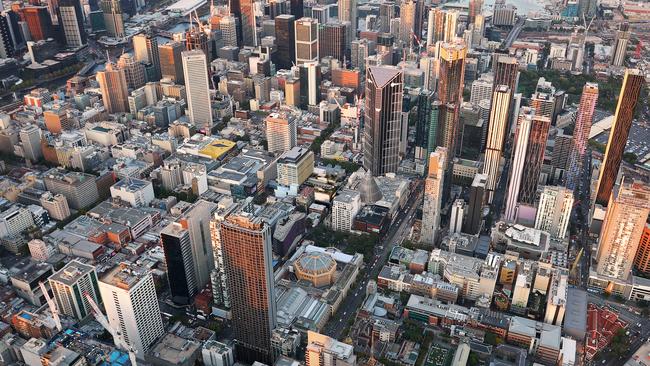Business push to downsize post-pandemic
Corporate Australia is looking to slash costs by shifting to cheaper offices and moving to sell under-used property.

Corporate Australia is looking to slash costs by shifting to cheaper offices and moving to sell under-used property as it comes out of the coronavirus crisis.
Major companies are gradually bringing back their workers into offices in coming weeks as businesses follow back-to-work directives issued by health authorities, but some are already planning to downsize their workspace requirements.
Thousands of staff have already been laid off due to the coronavirus crisis and some companies and government departments are readying to shift to new areas away from city centres.
The first signs have come in leasing briefs, where companies are weighing up leaving expensive city towers and taking space in newer but less expensive buildings where developers are also offering big incentives.
In one of the largest moves, Australia Post is weighing a shift from its Bourke Street headquarters and may shift to a fringe office building in Melbourne, with Medibank Private and the Commonwealth Bank also seeking new digs.
EY Oceania managing partner, real estate, Selina Short, said property had been catapulted on to the CEO agenda. “Organisations are looking at their workforce and precisely how they work and where work will be done in the future,” she said.
The adviser said the crisis could mean a shift to smaller CBD headquarters serving as a main hub for clients, with a satellite network of smaller offices.
EY has also been dealing with companies that are dumping desk sharing and cutting back on activity-based work spaces that make social distancing impossible, which could spur demand for more space despite white collar job cuts.
“For now, we’ll need all the space we can get, and with office vacancies in Sydney and Melbourne sitting at less than 4 per cent earlier this year there is insulation in the major cities,” Ms Short said.
Health insurer Medibank said its lease in Melbourne’s Docklands expired in September 2024 and it had appointed a property adviser to explore options in the Melbourne CBD area.
But at about 40,000sq m, Australia Post’s brief is the largest, and it confirmed it was undertaking a review of ahead of its lease expiring at 111 Bourke Street in November 2024, and at 180 Lonsdale Street in February 2025.
It is looking at buildings including a scheme by Grocon in North Melbourne and a LaTrobe Street tower being planned by the listed Mirvac, and even if it stays put its landlords may have to reconfigure the space in the wake of the virus.
The post office three years ago sold the freehold of the Sydney GPO to Singapore’s Far East Organization and sister company Sino Land Company for about $150m, and in March sold the Adelaide Mail Centre to Kennards Self Storage. It has just sold its former Queensland distribution centre in Brisbane to developer VIMG for $26m. More government and private groups are expected to scrutinise their property costs, with federal and state governments set to issue briefs for a combined 70,000sq m of space in Parramatta as they try to spark economic activity in the city’s job-hungry western suburbs.
Charter Hall chief executive David Harrison said the crisis had shown companies the importance of having modern premises for their people.
“I think there will be more demand for higher technology office buildings rather than 30 to 40-year-old clunkers,” he said. Mr Harrison predicted that any pain in the commercial property would be in older buildings that tenants moved out of as they sought newer premises that could house their staff.
He also predicted an “explosion” of sale and leaseback transactions over the next couple of years as companies look to free up capital by selling off office and industrial portfolios.
Investors only want to buy from the best names or in industries that will keep ticking over if the economy slows.
Hard-pressed Seven West Media this week finalised a $75m deal to sell its Osborne Park headquarters in Perth to property funds manager Primewest, headed by businessman John Bond, son of the late 1980s tycoon Alan Bond.
The Pratt family-owned packaging company Visy also sold an industrial facility in Penrith in Sydney’s west under a lease structure, with a seven-year lease for $17.25m, in a deal brokered by JLL’s Tony Iuliano and Roger Miller and Colliers International’s Gavin Bishop and Sean Thomson.
The two largest portfolios still in play are a parcel of four Aldi distribution centres that property funds manager Charter Hall is favoured to pick up for close to $700m, in a deal reflecting pricing not far from pre-coronavirus levels. Pharmaceuticals company Sigma is looking to offload a $250m portfolio via PwC.
Buyers are chasing assets that are owned by companies offering what have become essential services.
Telstra is selling a $400m data centre property in Melbourne via investment bank UBS as investors seek to back the booming area.




To join the conversation, please log in. Don't have an account? Register
Join the conversation, you are commenting as Logout